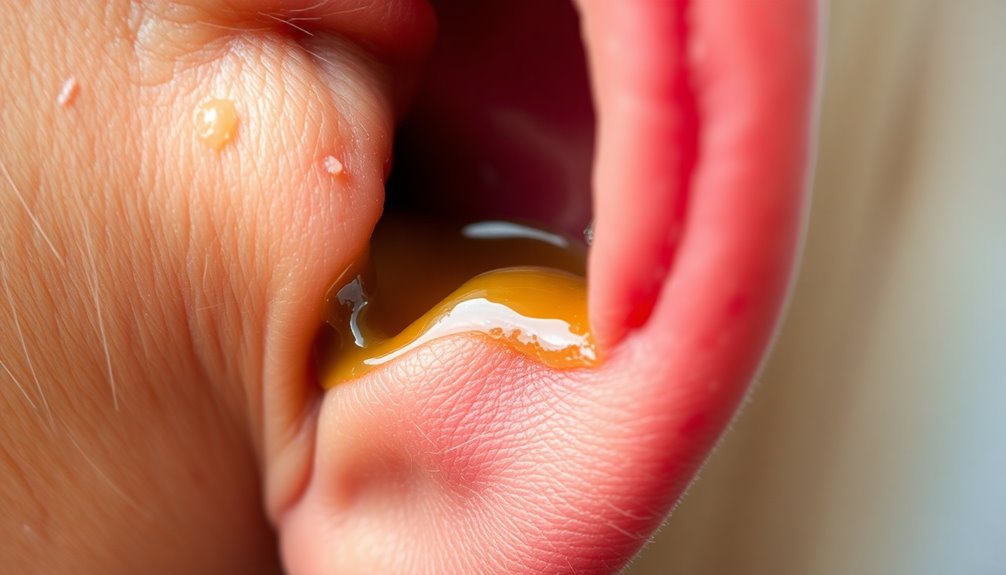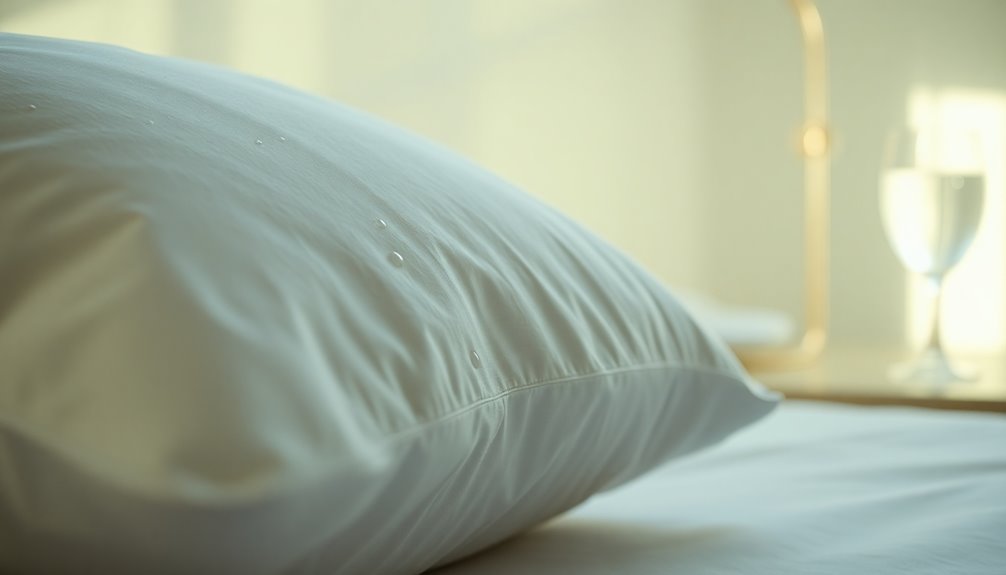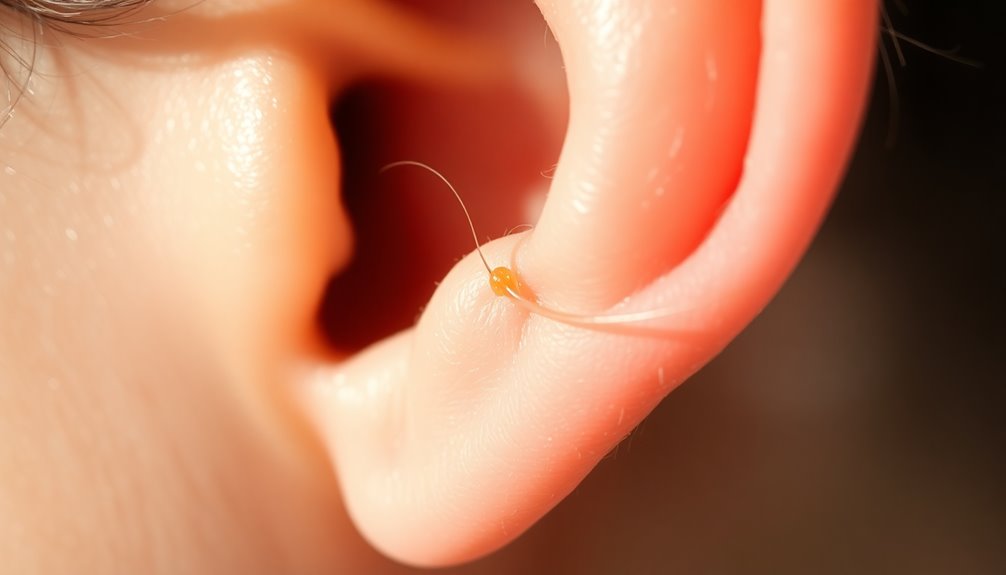If you're dealing with smelly ear wax and itchy ears, it's not just annoying—it can indicate significant health issues. A foul odor may signal bacterial or fungal infections, while itchiness often relates to allergies or skin conditions like eczema. Neglecting these symptoms can lead to more severe problems, including hearing loss. Plus, excessive earwax buildup can trap bacteria, causing unpleasant odors and discomfort. To manage these issues, you can try home remedies, but it's essential to recognize when to seek medical advice. Stick around, and you'll discover more about effective solutions and preventive measures tailored for your ear health needs.
Key Takeaways
- Smelly ear wax often indicates infections or excessive buildup, requiring medical evaluation to avoid complications.
- Itchy ears can result from allergies, skin conditions, or wax buildup, necessitating proper diagnosis and treatment.
- Both symptoms may indicate an underlying ear infection, which can lead to pain and hearing loss if untreated.
- Home remedies like olive oil can help soften wax, while apple cider vinegar may alleviate itchiness and prevent further irritation.
- Regular ear hygiene, including gentle cleaning and avoiding cotton swabs, can prevent excessive wax buildup and related discomfort.
Understanding Smelly Ear Wax
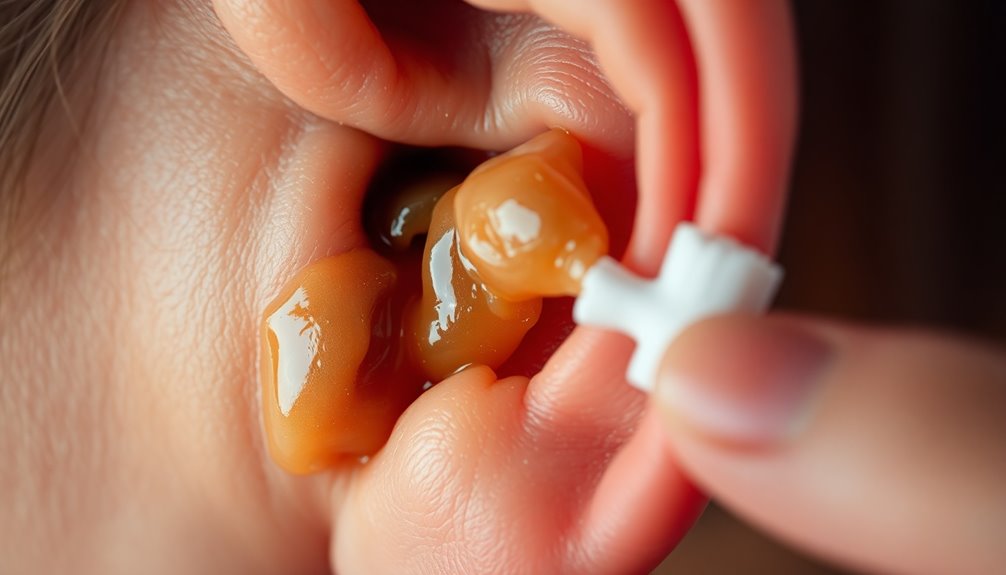
Smelly ear wax can be a frustrating and uncomfortable issue that many people experience. You might notice a foul odor along with symptoms like earache, hearing loss, or a feeling of fullness in your ear. These symptoms may signal that something's not quite right.
Several factors contribute to smelly ear wax. For instance, an ear infection—whether bacterial or fungal—can lead to an unpleasant smell. If you have excessive ear wax buildup, it can also produce a strong odor.
Sometimes, foreign objects stuck in your ear, such as beads or insects, can create issues as well. The condition known as swimmer's ear, which occurs when water is trapped in your ear, can also result in smelly ear wax.
It's essential to pay attention to these signs. If you're experiencing persistent odor or discomfort, consider seeking medical evaluation to determine the underlying cause. Treatments may include professional wax removal or using specific ear drops to manage symptoms.
Causes of Itchy Ears
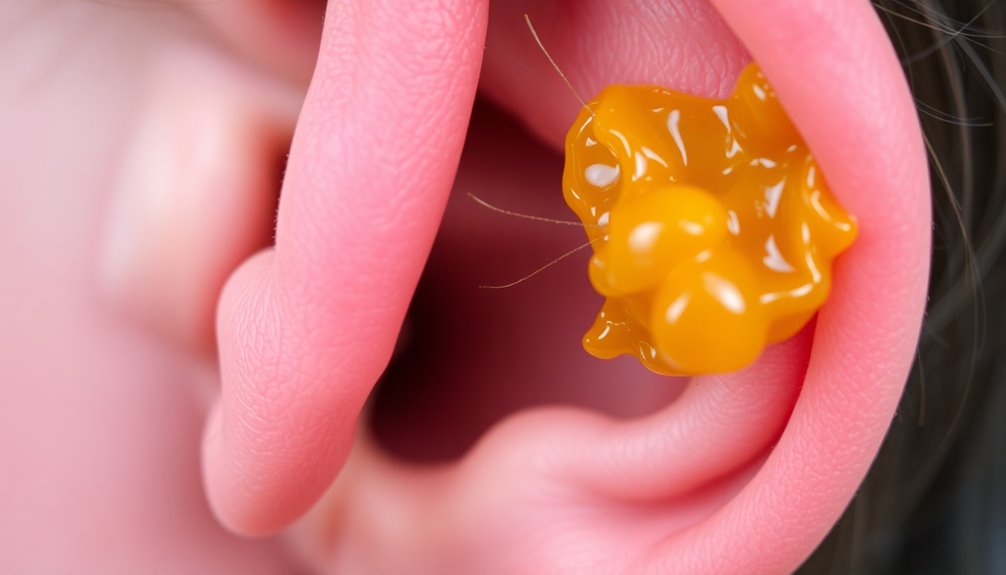
Itchy ears can stem from various causes, often linked to skin conditions, allergies, or ear wax buildup. One common culprit is dry skin in the ear canal, which can lead to irritation and itching. Allergens like pollen, dust mites, or even sensitivities to hair and skincare products can trigger these uncomfortable sensations. Additionally, early recognition of itchy ears can play a crucial role in managing and alleviating discomfort effectively.
Skin conditions such as eczema, psoriasis, or seborrheic dermatitis may also affect the skin inside your ears, causing persistent itching.
Excessive ear wax is another frequent cause of itchiness. When wax builds up, it can create a feeling of fullness and lead to irritation. It's important to avoid using cotton swabs, as they can push wax further into the canal and worsen the problem. Instead, you can gently remove visible wax with a damp cloth or consider over-the-counter irrigation solutions.
Moreover, external factors like hearing aids, earbuds, or certain jewelry can irritate your ear's sensitive skin, leading to itching.
If you're experiencing persistent discomfort, it's best to consult a healthcare professional to identify the specific cause and find appropriate relief.
Ear Infections and Symptoms
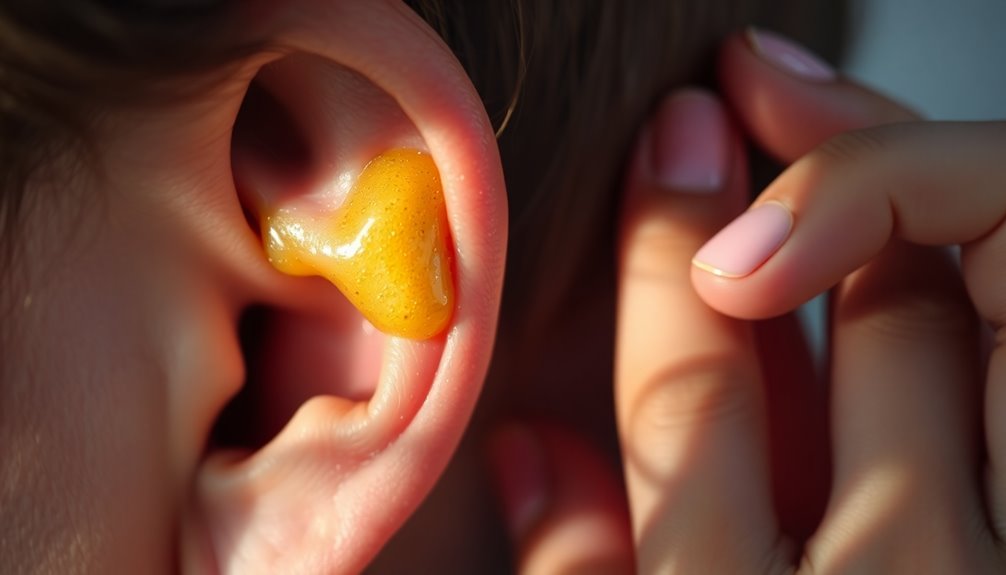
When you experience discomfort in your ears, it could be a sign of an ear infection. Common symptoms include earache, which might feel sharp or dull, and you may notice mild deafness or muffled sounds. If you see ear discharge or develop a fever, those are additional signs that something's not right. Headaches can also accompany these symptoms, adding to your discomfort.
It's important to recognize how ear infections can present differently depending on your age. If you're an adult, you might experience ear pain, fluid drainage, and trouble hearing. In children, signs may include increased ear pain when lying down, tugging at the ear, fussiness, and difficulty sleeping. Additionally, if left untreated, ear infections can lead to serious complications, such as brain abscesses, which can significantly increase the risk of severe health issues.
If left untreated, ear infections can lead to serious complications, such as chronic fluid buildup, which might cause significant hearing loss. In rare cases, infections can spread, leading to conditions like meningitis or even brain abscesses.
Don't ignore these symptoms; if you suspect an ear infection, consult a healthcare professional promptly to avoid potential long-term effects.
Earwax Buildup Complications
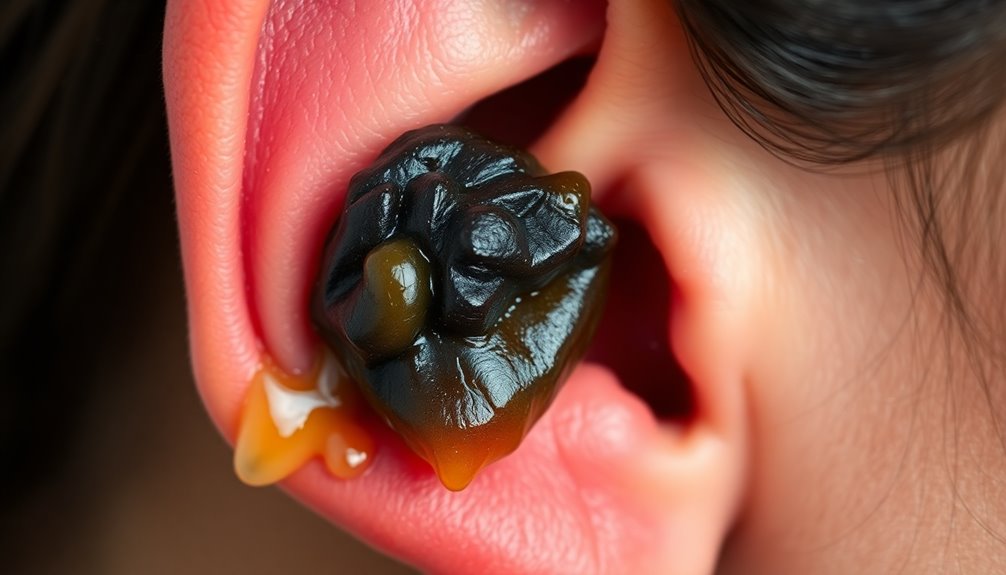
Earwax buildup can lead to various complications that may affect your overall ear health. One of the most noticeable issues is hearing loss. When earwax blocks your ear canal, it can significantly diminish your hearing abilities. You might also experience ear pain and a persistent feeling of fullness, which can be uncomfortable.
In some cases, the buildup can create an unpleasant ear odor due to trapped bacteria, making social situations awkward. You may even find yourself dealing with dizziness or vertigo as impacted earwax presses against your eardrum. If you wear hearing aids, excessive earwax can lead to malfunctions, complicating your hearing experience further. Excessive earwax is also a common cause of these complications and can affect anyone, regardless of age.
Additionally, it's important to note that untreated earwax buildup can increase the risk of ear infections, which may require medical attention. Rarely, you might experience a cough caused by impacted earwax irritating the throat.
Lastly, you could develop tinnitus, leading to a constant ringing in your ears. To avoid these complications, regular ear care is essential. Remember, prevention is key, so steer clear of inserting objects in your ears and consider professional cleanings when necessary.
Skin Conditions Affecting Ears
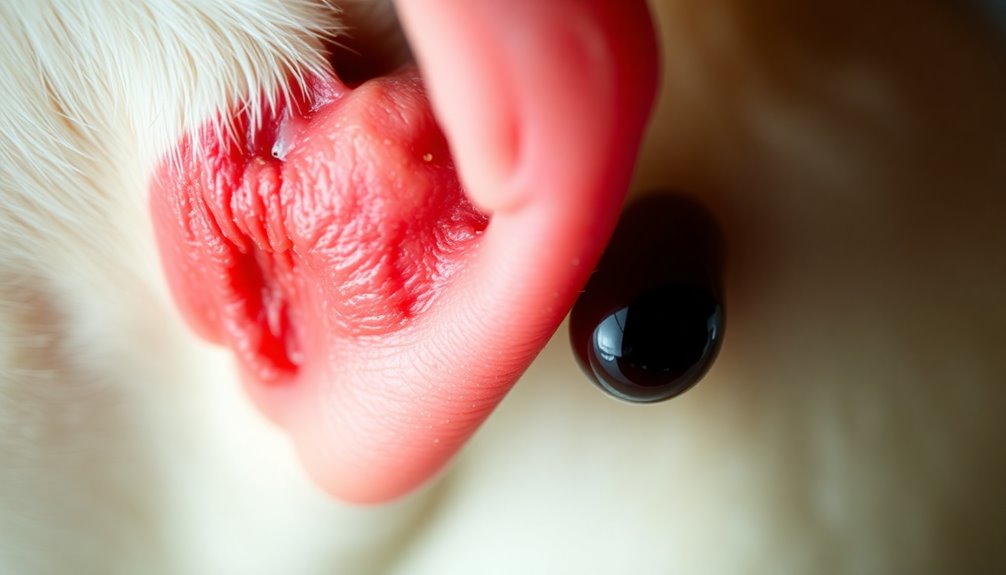
Skin conditions can significantly impact the health of your ears, leading to discomfort and potential complications. Various types of eczema, such as atopic eczema, can cause your ears to become dry, itchy, and red. You might notice painful cracks at the junction between your earlobe and face, making it hard to ignore. Additionally, skin irritation may lead to bacterial or fungal infections if left untreated. Understanding narcissistic behaviors can also be beneficial in recognizing emotional responses to physical discomfort.
Contact eczema can develop from allergies to earrings, shampoos, or cosmetics, so it's essential to identify and avoid triggers. Seborrheic dermatitis, sometimes called seborrheic eczema, can also affect your ears, often appearing alongside scalp issues. Aural eczematoid dermatitis may arise spontaneously, particularly if you have psoriasis or seborrheic dermatitis. Asteatotic eczema tends to flare up during dry weather, especially in winter.
Symptoms include intense itching, redness, scabs, and even oozing from the affected area. You might experience a feeling of hearing loss due to inflammation in the ear canal. To manage these conditions, topical corticosteroids and emollients can help reduce inflammation and hydrate your skin. Remember to avoid irritants and opt for gentle cleansers to maintain ear health.
Fungal Infections Explained
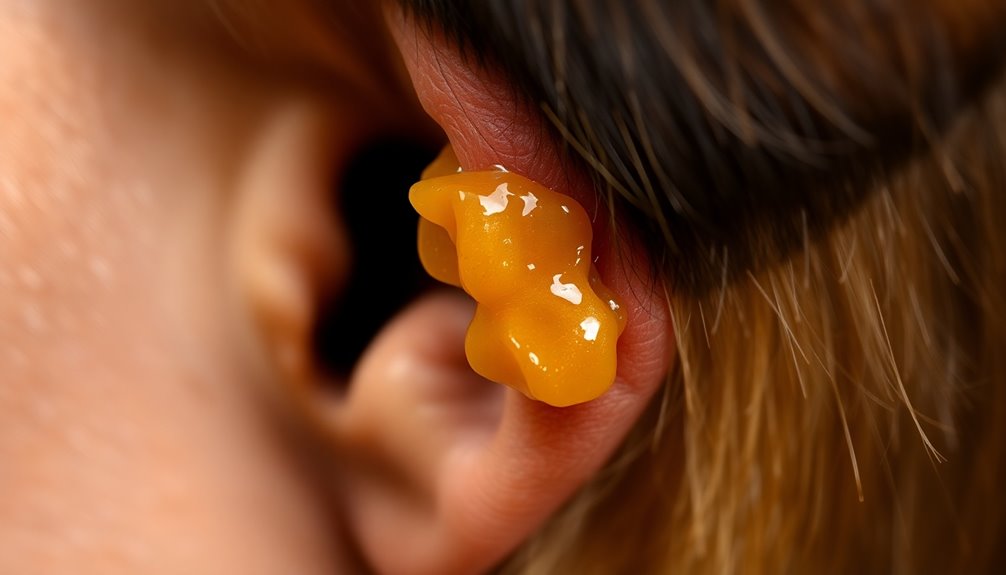
Infections can complicate ear health, and fungal infections are a common concern. These infections thrive in warm, humid environments, making activities like swimming or scuba diving risky.
If you frequently use headphones or scratch your ears with hard objects, you might injure the skin, increasing your chances of developing a fungal infection. Reduced earwax, often due to seawater exposure or cotton swab use, can also leave your ears vulnerable. Fungal infections are particularly prevalent among water sports enthusiasts, which can heighten your risk.
Symptoms include earache, intense itching, and flaky skin around the ear canal. You may notice a feeling of fullness, discharge, temporary hearing loss, or even tinnitus. If your symptoms persist despite using typical bacterial infection treatments, you should see a doctor. They'll likely perform an ear swab and visual inspection to confirm the diagnosis.
To treat fungal infections, doctors may prescribe antifungal drops, creams, or oral medications. Over-the-counter pain relievers can help manage your discomfort.
To prevent these infections, consider using earplugs during water activities and ensure your ears are dry after bathing. Avoid cotton swabs, as they can push debris further into the ear canal. Taking these steps can help you maintain better ear health.
Allergies and Ear Discomfort
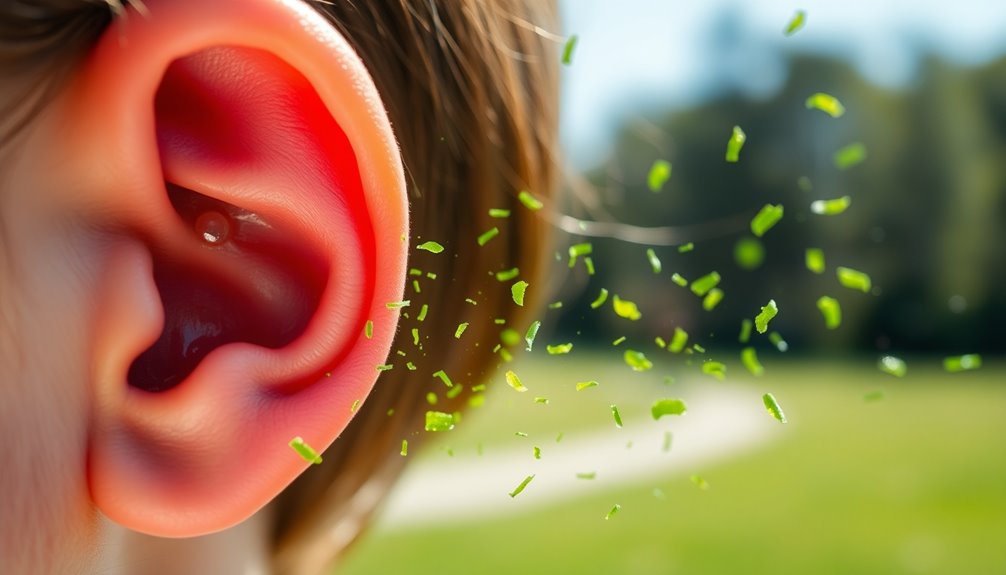
Allergies can significantly impact your ear health, causing discomfort and a range of symptoms. When you encounter allergens like pollen, dust mites, or pet dander, your immune system kicks into gear, producing IgE antibodies. This triggers the release of histamine, leading to increased mucus production and inflammation.
Since your ears, nose, and throat are interconnected, this inflammation can directly affect your ears. Blocked Eustachian tubes due to swelling prevent fluid from draining from your middle ear, creating a feeling of pressure or fullness. This fluid buildup can result in ear pain, reduced hearing, and poor balance. Additionally, the inflammation of the Eustachian tubes can lead to further complications if left untreated.
If trapped fluid becomes infected, you might experience more severe symptoms like fever and ongoing discomfort. The risk of developing ear infections rises significantly with allergies, especially if you're already dealing with seasonal or year-round triggers.
Untreated infections can lead to long-term complications, including hearing loss. To manage these issues, it's crucial to address your allergies directly. Avoiding allergens, using HEPA filters, and considering daily antihistamines can help alleviate ear discomfort and reduce your risk of infections.
If symptoms persist, consulting a doctor is essential for proper treatment.
Home Remedies for Relief

Many people seek home remedies to relieve discomfort from smelly ear wax or itchy ears. You can start by softening and removing ear wax with olive oil. Warm a few drops and dribble it into the affected ear; after a while, use a cotton swab to gently remove the softened wax. In some cases, regular ear cleaning can help prevent excessive ear wax buildup.
Coconut and baby oil work similarly—just instill a few drops and flush with warm water after an hour or two.
For itchiness, a drop of olive or baby oil can provide relief. Apply before bed to avoid affecting hearing aids. If you prefer something a bit more potent, mix equal parts apple cider vinegar and water, apply it to the ear, and let it sit before draining. A half-and-half solution of rubbing alcohol and vinegar can also help dry out excess moisture.
If you suspect an infection, garlic oil's antimicrobial properties can help. You can make it by cooking garlic in mustard oil and applying a few drops. Tea tree oil mixed with olive oil can also combat infections while soothing itchiness. These remedies can help you find much-needed relief from your ear troubles!
Preventive Measures to Consider
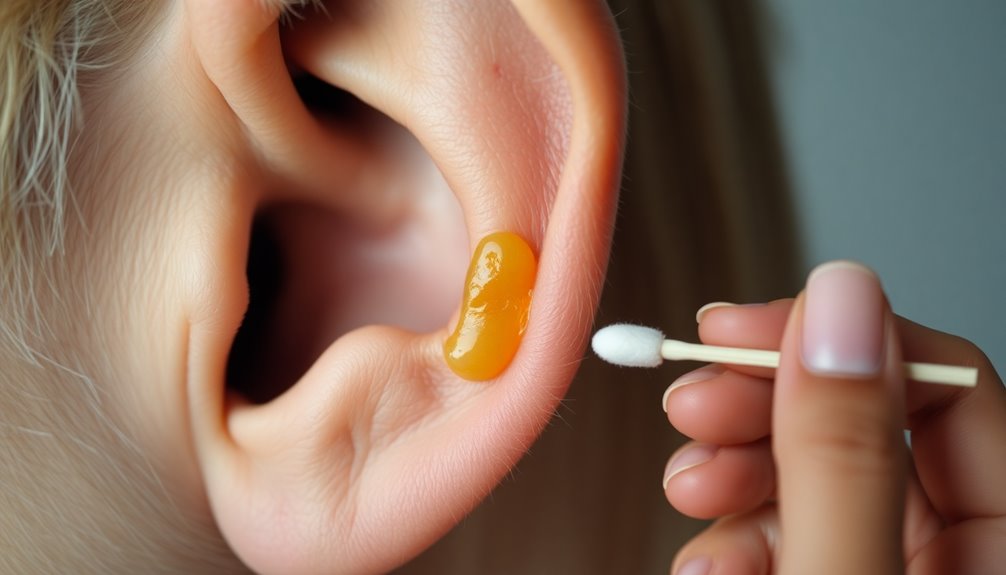
Maintaining good ear hygiene is essential to prevent problems like smelly ear wax and itchy ears. First, avoid using cotton swabs, bobby pins, or any sharp objects to clean your ears. Instead, use a washcloth on your finger to gently clean the outer ear. Remember, earwax is a natural moisturizer that protects your ears, so don't remove it regularly. Additionally, the self-cleaning nature of ears means that excessive cleaning can lead to irritation and blockages.
Also, steer clear of ear candles, as they can be both ineffective and harmful.
To prevent ear infections, wear earplugs when swimming to keep water out of your ear canal. After swimming or bathing, tilt your head to let excess water drain and use a hair dryer on low heat to dry your ears. Keeping your ears dry helps prevent bacterial or fungal growth.
If you suffer from allergies, it's crucial to identify and manage them, as they can lead to itchy ears. Antihistamines may help. Treat any skin conditions, like psoriasis, with prescribed medications and keep the area around your ears clean.
Lastly, avoid loud noises and keep hair products away from your ears to prevent irritation. Taking these preventive measures can help maintain ear health and comfort.
Frequently Asked Questions
Can Smelly Ear Wax Indicate a Serious Health Issue?
Yes, smelly earwax can indicate a serious health issue. It often signals an underlying infection, such as swimmer's ear, or an obstruction due to excessive buildup.
If you notice a foul odor along with itching or pain, it's essential to consult a healthcare professional. Ignoring these symptoms can lead to complications like hearing loss or more severe infections.
Don't hesitate to seek medical attention to ensure your ear health is maintained.
Are Certain Foods Linked to Itchy Ears?
Yes, certain foods are linked to itchy ears. You might experience itchiness after consuming common allergens like nuts, milk, fish, or shellfish.
Fruits such as apples, melons, and bananas can also trigger itchiness due to oral allergy syndrome.
If you notice itchiness around your ears, mouth, or face after eating, it's important to track your diet and consult a healthcare professional to identify potential allergens and manage your symptoms effectively.
How Often Should I Clean My Ears?
You should clean your ears based on your individual needs. For many, once a year is sufficient, but every six months is often recommended.
If you wear hearing aids or produce excessive wax, consider cleaning every three months. Factors like age, genetic predisposition, and ear function also influence how often you should schedule cleaning.
Pay attention to symptoms like muffled hearing or fullness, as these can indicate it's time for a check-up.
Can Wearing Earplugs Cause Earwax Buildup?
Yes, wearing earplugs can definitely cause earwax buildup.
They can push wax deeper into the ear canal and block its natural exit. If you use earplugs frequently, you might notice more wax production and irritation in your ears.
This can lead to discomfort, earaches, and even hearing difficulties.
To prevent issues, try to limit earplug use and consider regular ear cleaning methods to keep your ears healthy and clear.
Is It Safe to Use Cotton Swabs for Ear Cleaning?
It's best to avoid using cotton swabs for ear cleaning. They can push wax deeper into your ear canal, leading to impaction and potential damage to your eardrum.
Instead of cleaning, you might end up causing infections or hearing loss. Stick to safer methods like ear drops or consult a healthcare professional for removal.
Your ears usually clean themselves, so let them do their job without interference from cotton swabs.
Conclusion
In conclusion, don't ignore the signs of smelly ear wax and itchy ears. Understanding the causes can help you take action and find relief. Whether it's an infection, allergies, or skin conditions, addressing these issues early on can prevent complications. Try some home remedies and consider preventive measures to keep your ears healthy. If symptoms persist, consulting a healthcare professional is key. Your ears deserve the best care, so listen to them!
